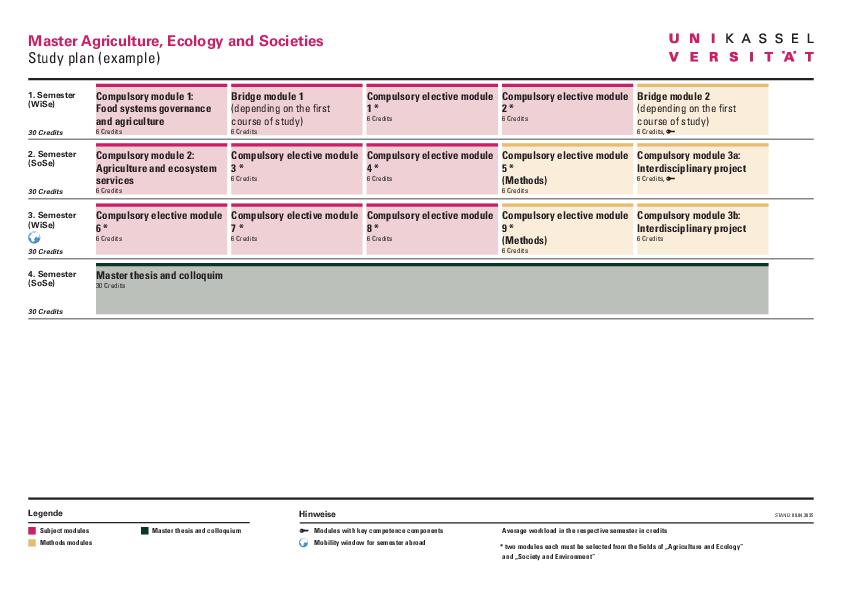Program structure
During the two years of the program, students will be required to complete 120 credits of coursework, which includes:
- Agriculture and ecosystem services
- Food systems governance and agriculture
Students with a life sciences background take:
- Research methods in social sciences
- History, societies and environment
Students with a social sciences background take:
- Research methods and data science in the life sciences, and
- either Priciples of organic farming or Soil and plant sciences or Organic livestock farming under temperate conditions
In small groups, students engage in research and/or transformation projects concerning food and agricultural systems and the role of Europe. Each project is supervised by two lecturers from different disciplines.
Different project topics and formats are offered every year. These can also be co-developed among students and lecturers. Some examples:
- Colonialism, food culture, history and sustainability of rice cultivation in Africa.
- What is 'sustainable'? Conceptual developments between cultural histories & the natural sciences
- Transformation(s) of animal husbandry and human-animal interactions
- Food culture, animal welfare and animal ethics in the Ahle Worscht cluster in North Hesse
- The thawing permafrost of Siberia: Potentials and risks of agricultural development
- Organic agriculture and agroecology in North Africa: From competition between cash crops and agroecology to compatible systems?
- Impact of the new European conformity rules on third countries in the context of the reform of the organic farming regulation
- The German Supply Chain Act and its impact on the Global South: The example of Indonesia
- Alternative food networks and local context: historical and socio-economic comparisons between the EU and North Africa.
- Agroecological innovation, power relations and international markets: Lessons from Latin America
Students can choose to specialise either in Agriculture and Ecology or Society and Environment. A wide variety of modules are offered in both areas each semester (see module handbook).
In their fourth semester, AGES students embark on an independent research project of their choice. In the thesis, they combine the theories, approaches and methods learned during their studies, document methodological confidence and reflection, generate independent theses and reflect on them against the background of the international research discourse. The Master theis is presented in a colloquium.
Given its wide scope and few obligatory courses, AGES offers students the chance to proactively build their own professional profile. Possible thematic clusters to specialise include:
- Agro-food system governance: Focus on themes such as Institutional Economics, Institutions in the Food System, Rural Sociology, Political Economy and Development, Regional Planning and EU Institutions.
- Social Movements and Advocacy: Focus on themes such as Development Studies, Participatory Research Methods, Labor and Social Movement Studies, Human-Nature and Human-Animal Studies, Environmental Ethics, Gender Studies, and Social & Cultural History.
- Management of agri-food transitions: Focus on themes such as Sustainability Management, International Organic Food Markets and Marketing, Sustainable Diets, Supply Chain Management, Food Quality and Processing, and Consumer Studies.
- Sustainable Agro-Ecosystem Design: Focus on themes such as Ecological Plant and Animal Science, Agroecosystem Analysis and Modelling, Agrobiodiversity, Regional Planning, Pest Management, Water Management and Agroforestry, among many others.
